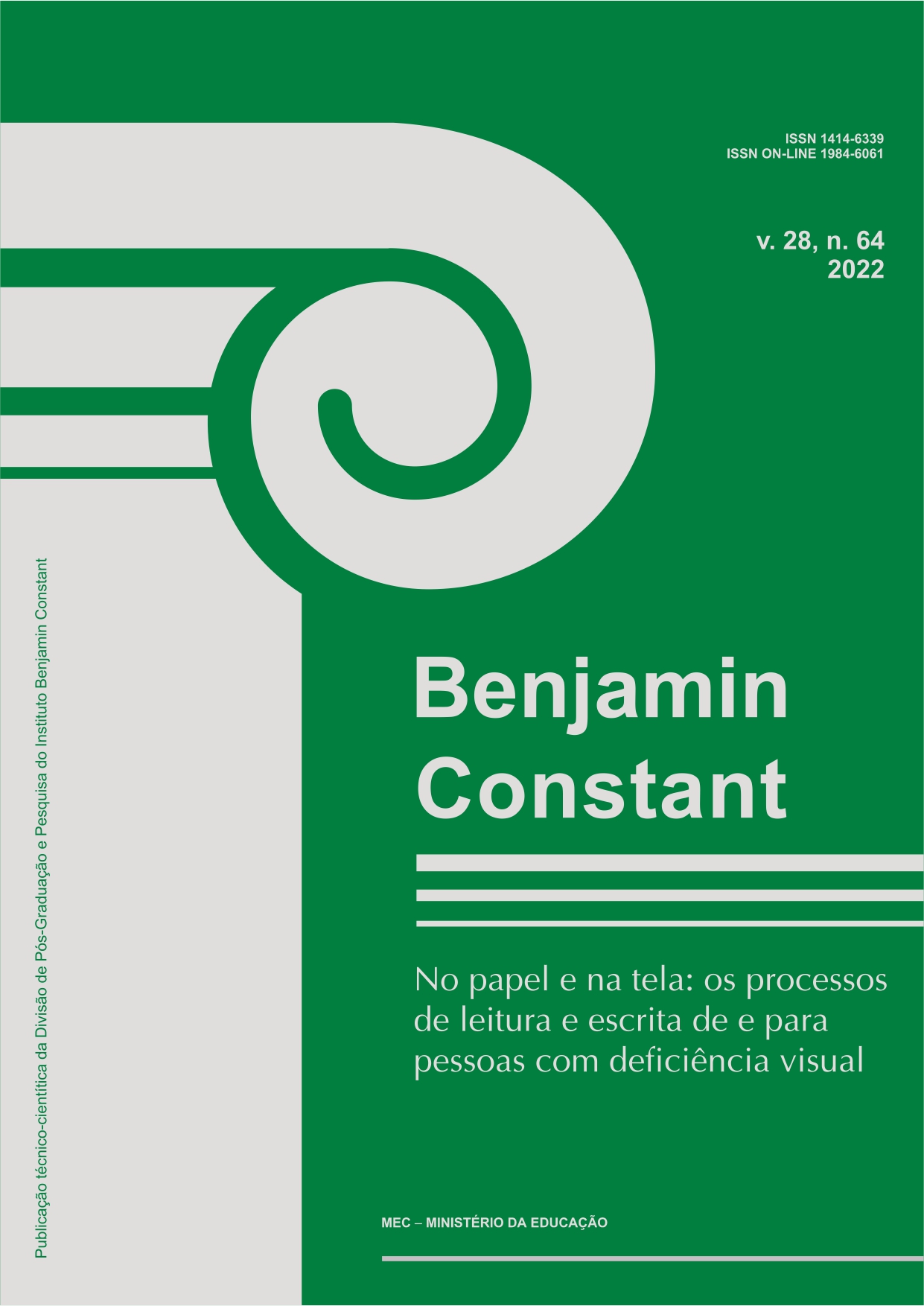Literacies of blind students from Brazil and Portugal
an analysis of the uses of reading in different social and educational spaces
Abstract
Blind people can access reading using the Braille System, with the help of readers, who are people who can see and read aloud to the blind, and also with the help of digital technologies through the voice synthesizer of screen reader programs. This paper presents an analysis of how blind students in Brazil and Portugal use reading in different social and educational spaces. We used the concept of social literacies proposed by New Literacy Studies and the concept of reading from the interactionist perspective, based on the Bakhtinian conception of language. A qualitative study was carried out and the semi-structured interview was used as a research device. Six blind students, aged 12 to 17, attending public schools in the northern region of Portugal and five blind students, aged 11 to 18, attending public and private schools in the state of Bahia participated in the research. In Portugal, we also interviewed teachers working in special education to obtain additional information. Based on the reports of students from both countries, we identified that, in general, computers and cell phones are the artifacts most used in the students’ daily life for reading practice and not only because of the lack of access to Braille, but also because most students prefer to read by means of these resources. It was possible to notice that both in Brazil and in Portugal there is difficulty in access to accessible books in Braille or in digital format. Schools appreciate reading through braille, but, in everyday life, the main mediators of literate practices are the readers and digital technologies. The results of this study show that Braille should continue to be taught, for it provides literacy and direct contact with the spelling of words; however, it is considered relevant to have a strong incentive for the use of laptops since the early grades of elementary school, since reading with oral support is frequent in the daily life of Brazilian and Portuguese blind students. Such ways and means of reading and writing in times of digital technologies should be valued in the school context in order to contribute to a quality and inclusive education.
References
ANDRADE, Maria de Fátima Ramos de. O conceito de alfabetização semiótica na atualidade: possíveis relações com o pensamento de Paulo Freire. In: VI Encontro Internacional Fórum Paulo Freire, São Paulo, 2008.
BARTON, David; HAMILTON, Mary. Local literacies: reading and writing in one community. London: Routledge, 1998.
BRASIL. Lei nº 13.146, de 6 de julho de 2015. Institui a Lei Brasileira de Inclusão da Pessoa com Deficiência (Estatuto da Pessoa com Deficiência). Diário Oficial da União, seção 1, Brasília, DF, ano 152, n. 127, p. 2, 07 jul. 2015.
GERALDI, João Wanderley. O texto na sala de aula. 4. ed. São Paulo: Ática, 2011.
KLEIMAN, Ângela. Ação e mudança na sala de aula: uma pesquisa sobre letramento e interação. In: ROJO, Roxane. (org.). Alfabetização e letramento: perspectivas linguísticas. Campinas, SP: Mercado de Letras, 1998, p. 173-203.
KOCH, Ingedore Villaça; ELIAS, Vanda Maria. Ler e compreender: os sentidos do texto. São Paulo: Contexto, 2015a.
KOCH, Ingedore Villaça; ELIAS, Vanda Maria. Ler e escrever: estratégias de produção. São Paulo: Contexto, 2015b.
MARTINEZ, Amanda Botelho Corbacho. Entre a leitura tátil e a leitura oral: letramentos de jovens cegos na contemporaneidade. 2019. 236 f. Tese (Doutorado em Educação) – Faculdade de Educação, Universidade Federal da Bahia, Salvador, 2019. Disponível em: https://repositorio.ufba.br/handle/ri/32546. Acesso em: 29 maio 2022.
MINAYO, Maria Cecília de Souza. Ciência, técnica e arte: o desafio da pesquisa social. In: MINAYO, Maria Cecília de Souza (org.); DESLANDES, Suely Ferreira; GOMES, Romeu; CRUZ NETO, Otávio. Pesquisa social: teoria, método e criatividade. Petrópolis, RJ: Vozes, 1994. p. 9-29.
STREET, Brian V. Eventos de letramento e práticas de letramento: teoria e prática nos novos estudos do letramento. In: MAGALHÃES, Izabel (org.). Discursos e práticas de letramento: pesquisa etnográfica e formação de professores. Campinas, SP: Mercado das Letras, 2012. p. 69-92.
STREET, Brian V. Letramentos sociais: abordagens críticas do letramento no desenvolvimento, na etnografia e na educação. São Paulo: Parábola, 2014.





.png)
